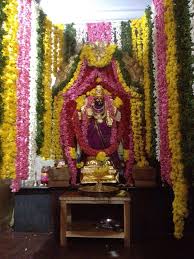Sri Bhramaramba Mallikarjuna Temple is dedicated to Lord Shiva located in AndraPradesh. Sri Bhramaramba Mallikarjuna Temple are the abodes of Lord Mallikarjuna in the form of Lord Shiva and Goddess Bhramaramba in the form of Goddess Parvati, is a famous temple situated at "Srisailam", Andhra Pradesh. Lord Shiva abodes here in the form of Lingam and Jyotirlingam is a devotional radiant symbol of Lord Shiva. The presiding deity is Lord Mallikarjuna is swayambu who is self manifested appearing with his consort Goddess Bhramramba is one of the 18 Shakti Peethas, in existence since ancient time. Lord Shiva iconic Lingam is in a symbolic form of firmness which is phallus by nature is worshipped by devotees as Lord Mallikarjuna with his comsort Goddess Bhramramba, also worshipped as goddess Brahmani Shakti with eight arms, in her Silk Sari Attire.
Legacy of Lord Mallikarjuna and Goddess Bhramramba
According to Agni Purana, once Demon King Hiranyakashipu did severe penance to please Lord Mallikarjuna and was blessed with a boon that unrivalled combat prowess, high skill in use of bow and battle weapons with the blessings of other gods. According to Skanda Purana, Lord Rama and Goddess Sita has worshipped Lord Mallikarjuna in Tretayuga. Once Pandava brothers has visited this temple and offered prayers to Lord Mallikarjuana during Dwapara Yuga. Also Great Sages and philosophical Saints have visited this temple namely Siddha Nagarjuna, Sage Adi Sankaracharya, Siva Sarani Akka Mahadevi and Veerashaiva Saint Allama Prabhu. Once Chandravathi, daughter of Chandragupta Patana, worshipped jyotirLinga daily by adorning it with Jasmine (Mallika) flowers. Lord Mallikarjuna appeared before her, blessed salvation, sending her to Kailash. This temple is famous for seeking the blessings to clear past sins, attain self-realization and ultimate well-being.
Dwadash Jyotirlingas or 12 Jyotirlingas
Jyotirlingas shows the light through radiance of Lord Shiva, where "Jyoti" means radiance and linga means "Iconic of Lord Shiva" and is a combination of light and soul in an non-human form. The Jyotirlinga is a form of Lord Shiva the supreme, out of which Lord Shiva appeared in another form "Lingodbhava", denotes the emergence of Linga, augments the sacred worship in a phallic form, denotes firmness, soundness, self-control which is the key to living of divine life to the fullest, which lead to Righteousness, Truth, Dedication, wisdom, Nature, Ultimate phenomena, Meritorious Deed, wholesome consciousness and fine plane of existence, fully attained. The 12 Jyotirlingas are:
Lord Somnath in Gir Somnath, Gujarat
Lord Mallikarjuna in Srisailam, Andhra Pradesh
Lord Mahakaleswar in Ujjain, Madhya Pradesh
Lord Omkareshwar in Khandwa, Madhya Pradesh
Lord Kedarnath in Rudraprayag, Uttarakhand
Lord Bhimashankar in Maharashtra
Lord Vishwanath in Varanasi, Uttar Pradesh
Lord Trimbakeshwar in Nashik, Maharashtra
Lord Baidyanath in Deoghar, Jharkhand
Lord Nageshvara in Dwarka, Gujarat
Lord Ramanathaswamy in Rameshwaram, Tamil Nadu
Lord Grishneshwar in Aurangabad, Maharashtra
m is performed as an auspicious beginning alongwith chanting Sri Rudram and Chamakam and Bilva archana, followed by Lingam Abhisekam. This is a divine worship to 12 holy Jyotirlingas and the natives will be relieved from cosmic cycle of life and death
Do:
-
Do pray your Ishta Devata before pilgrimage to Temple.
-
Do contact Temple Devasthanam information centre for enquiry, temple information and for Pooja details etc.
-
Do reserve your travel and accommodation at Temple well in advance.
-
Do bath and wear clean clothes before you enter the temple.
-
Do concentrate on God and Goddess inside the temple.
-
Do maintain silence and recite Om Namahsivaya or your Istamantram to yourself inside the temple.
-
Do observe ancient custom and traditions while in Temple.
-
Do respect religious sentiments at Temple.
-
Do deposit your offerings in the hundi only.
Don't s:
-
Do not come to Temple for any purpose other than worshipping of God and Goddess.
-
Do not smoke at Temple.
-
Do not consume alcoholic drinks at Temple.
-
Do not eat non-vegetarian food in the Kshetram.
-
Do not approach mediators for quick Darshanam. It may cause inconvenient to others.
-
Do not carry any weapon inside the temple.
-
Do not wear any head guards like helmets, caps, turbans and hats inside the temple premises.
-
Do not perform Sastanga Pranama inside the Sanctum Sanctorum.
-
Do not take much time while performing Sparsa Darshanam to God in Garbhagriha.
-
Do not buy spurious prasadams from street vendors.
-
Do not encourage beggars at Temple.
-
Do not spit or create nuisance in the premises of the temple.
Do:
-
Do pray your Ishta Devata before pilgrimage to Temple.
-
Do contact Temple Devasthanam information centre for enquiry, temple information and for Pooja details etc.
-
Do reserve your travel and accommodation at Temple well in advance.
-
Do bath and wear clean clothes before you enter the temple.
-
Do concentrate on God and Goddess inside the temple.
-
Do maintain silence and recite Om Namahsivaya or your Istamantram to yourself inside the temple.
-
Do observe ancient custom and traditions while in Temple.
-
Do respect religious sentiments at Temple.
-
Do deposit your offerings in the hundi only.
Don't s:
-
Do not come to Temple for any purpose other than worshipping of God and Goddess.
-
Do not smoke at Temple.
-
Do not consume alcoholic drinks at Temple.
-
Do not eat non-vegetarian food in the Kshetram.
-
Do not approach mediators for quick Darshanam. It may cause inconvenient to others.
-
Do not carry any weapon inside the temple.
-
Do not wear any head guards like helmets, caps, turbans and hats inside the temple premises.
-
Do not perform Sastanga Pranama inside the Sanctum Sanctorum.
-
Do not take much time while performing Sparsa Darshanam to God in Garbhagriha.
-
Do not buy spurious prasadams from street vendors.
-
Do not encourage beggars at Temple.
-
Do not spit or create nuisance in the premises of the temple.
